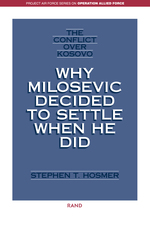The Conflict Over Kosovo
Why Milosevic Decided to Settle When He Did

Download Url(s)
https://www.jstor.org/stable/10.7249/MR1351AFAuthor(s)
Hosmer, Stephen T.
Language
EnglishAbstract
This report examines the reasons Slobodan Milosevic, the then president of the Federal Republic of Yugoslavia, decided on June 3, 1999, to accept NATO's conditions for terminating the conflict over Kosovo. Drawing in part upon the testimony of Milosevic and other senior Serb and foreign officials who directly interacted with Milosevic, the report analyzes (1) the assumptions and other calculations that underlay Milosevic's initial decision to defy NATO's demands with regard to Kosovo, and (2) the political, economic, and military developments and pressures, and the resulting expectations and concerns that most importantly influenced his subsequent decision to come to terms. While several interrelated factors, including Moscow's eventual endorsement of NATO's terms, helped shape Milosevic's decision to yield, it was the cumulative effect of NATO air power that proved most decisive. The allied bombing of Serbia's infrastructure targets, as it intensified, stimulated a growing interest among both the Servian public and Belgrade officials to end the conflict. Milosevic's belief that the bombing that would follow a rejection of NATO's June 2 peace terms would be massively destructive and threatening to his continued rule made a settlement seem imperative. Also examined are some implications for future U.S. and allied military capabilities and operations.
Keywords
History; Political ScienceDOI
10.7249/MR1351AFISBN
9780833032386, 9780833030030Publisher
RAND CorporationPublication date and place
2001Classification
International relations
Warfare and defence
